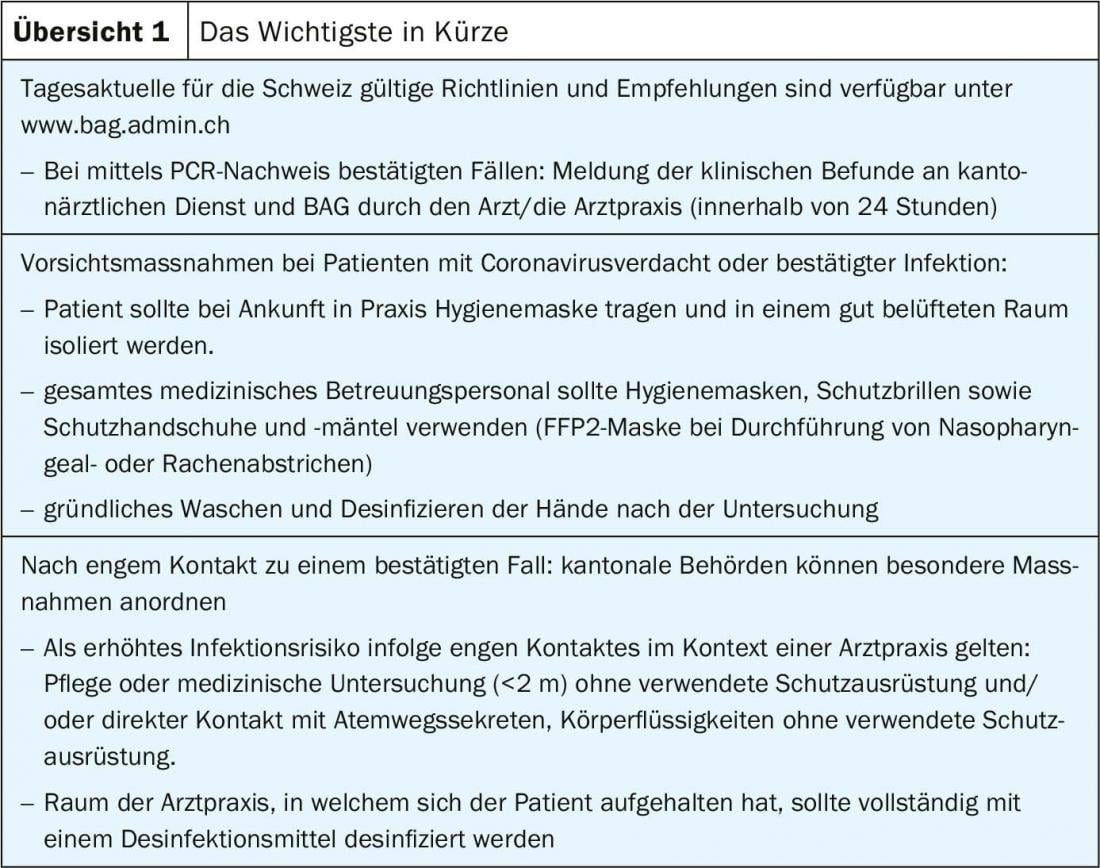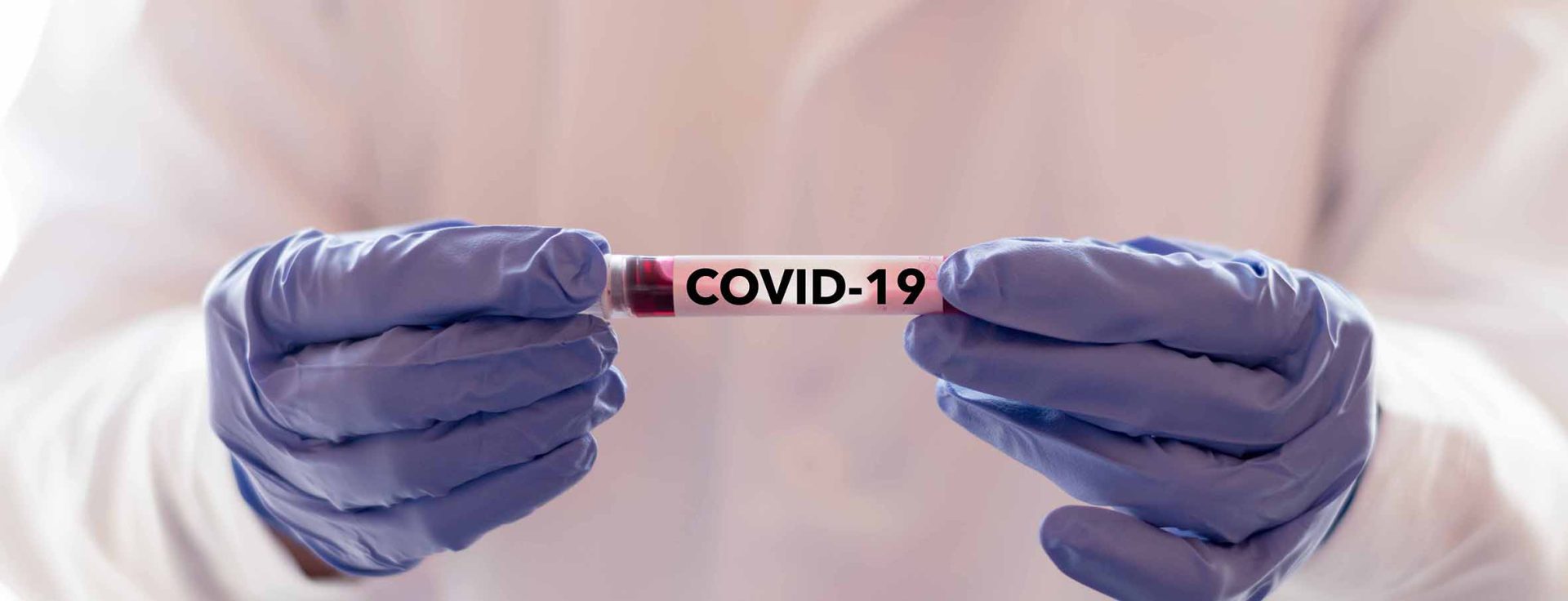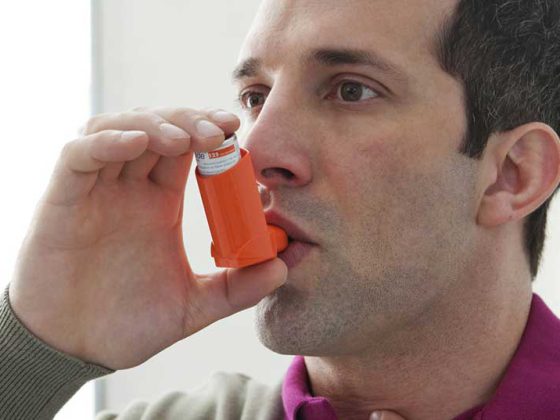More and more people are becoming infected with the new coronavirus SARSCoV-2. In order to contain the spread, the Federal Office of Public Health has published behavioral recommendations that are continuously adapted to the current situation. Special precautions and instructions apply to medical personnel.
The World Health Organization (WHO) has declared an international public health emergency [1]. This means that all WHO member countries are required to coordinate among themselves the crisis measures recommended by the organization against further spread. However, experts warn against panic and emphasize that staying calm and taking preventive measures is very important in the current situation. Regular thorough washing and disinfection of hands is essential to protect against pathogens such as the coronavirus. Clean hands reduce the risk of transferring pathogens from the hands to the face. This is part of the daily routine for medical staff, but for patients it means a change in everyday habits in many cases. Handshakes should be avoided if possible.

Observe current directives of the health authorities
Unlike the general population, it is almost impossible for medical personnel to avoid sick people. However, measures can be taken to minimize the risk of infection. With regard to the clarification algorithm and the handling of suspected cases, the current directives of the health authorities must be followed. The regularly updated version of the guidelines and recommendations valid for Switzerland is available on the homepage www.bag.admin.ch [2]. The leaflet regarding suspicion, sampling and reporting criteria is of particular relevance to primary care physicians and includes the following (as of 04.03.2020): All persons who meet the suspicion criteria and all hospitalized persons with bilateral pneumonia (or ADRS) of undetermined etiology are to be clarified by laboratory diagnosis, regardless of the suspicion criteria. Treating physicians report clinical findings of all confirmed cases by PCR detection to the cantonal medical service and the FOPH within 24 hours. Diagnostic laboratories report positive and negative findings for COVID-19 by PCR detection to the cantonal medical service and the FOPH within 2 hours. If the suspicion criteria of an infection with the new coronavirus are met, the cantonal physician decides on further measures and examinations. If it is known which hospital the cantonal physician has chosen, it may be useful to provide advance information to the responsibilities there. In addition, the patient’s transportation to the hospital may need to be arranged, according to the cantonal recommendations or the instructions of the cantonal physician. If necessary, instructions are required for the patient regarding isolation at home. The physician performing the test is responsible for completing the mandatory notification form.
How to reduce the risk of infection
It is recommended that the patient put on a hygiene mask upon arrival at the practice. The patient should be isolated in a well-ventilated room. All medical support personnel should use hygiene masks, protective eyewear if available, and protective gloves and gowns. When performing nasopharyngeal or throat swabs, use an FFP2 mask. If contact with a confirmed case was unprotected and close, special measures must be taken. Increased risk of infection due to close contact is considered to be: Nursing or medical examination (<2 m) without protective equipment used and/or direct contact with respiratory secretions, body fluids without protective equipment used. If these criteria are met, quarantine measures are taken in accordance with FOPH recommendations, the concrete implementation of which is ordered by the cantonal authorities. To reduce the risk of contamination, the room in the doctor’s office where the patient has been should be completely disinfected with a disinfectant before further use. Quarantine measures for staff are now being considered or ordered at several hospitals. This is because the health professionals may have been in contact with persons ill with coronavirus.
What to know about quarantine rules
In everyday life outside the doctor’s office, the following criteria for an increased risk of infection apply in addition to those already mentioned: persons living in the same household with at least 15 minutes of facial contact (“face-to-face”) with the confirmed case and, on air travel, passengers who had sat in the same row as the confirmed case or in the two rows in front of or behind him, regardless of the flight time. For crew members or other personnel, provided one of the above criteria applies (e.g., >15-minute conversation with confirmed case).
In view of several confirmed coronavirus cases at the beginning of March, the Aargau cantonal medical service published an information leaflet on quarantine measures for close contacts of persons infected with COVID-19 (www.ag.ch) [3]. The authority may order quarantine not only for persons with suspected coronavirus symptoms, but also for those who have been in close contact with infected persons. Affected persons must stay at home for 14 days after the last contact with the sick person and must not have any contact with other persons. A contact person is assigned, who is regularly questioned regarding the state of health. No visitors should be received and no public premises should be visited. Purchases are to be delivered at the front door; in the event of any unavoidable contact (for example, front door), a distance of more than 2 m from other persons is to be maintained and a mask is to be worn. Outdoor walks with a mask are allowed, contact with other people is to be avoided and no other buildings are to be entered. If you live in an apartment building or in a heavily populated neighborhood, affected individuals should stay home if possible. Cough or sneeze only into the crook of the elbow or into a handkerchief, then wash hands with soap and water or disinfect hands. If it is a multi-person household, make sure you are in a room with lockable doors where meals can be taken. Any visits and contacts are to be avoided and the room is to be left only if necessary. A hygiene mask must be worn outside the room (e.g. bathroom, toilet). In addition to regular hand washing, household items such as dishes, glasses, cups, kitchen utensils, towels or bedding should not be shared with other people. These items should be carefully cleaned with soap and water after use.
Literature:
- WHO: Coronavirus, www.who.int/health-topics/coronavirus
- BAG: Coronavirus, reporting forms, last accessed 04.03.2020 www.bag.admin.ch/bag/de/home/krankheiten/infektionskrankheiten-bekaempfen/meldesysteme-infektionskrankheiten/meldepflichtige-ik/meldeformulare.html, last accessed 04.03.2020
- Canton of Aargau: quarantine information for close contacts of a person infected with COVID-19 (new coronavirus SARS-COV-2), last accessed 04.03.2020 www.ag.ch/media/kanton_aargau/themen_1/coronavirus_1/20200301_Coronavirus_Merkblatt_Quarantaene.pdf, last accessed 04.03.2020
HAUSARZT PRAXIS 2020; 15(3): 41 (published 3/24/20, ahead of print).











